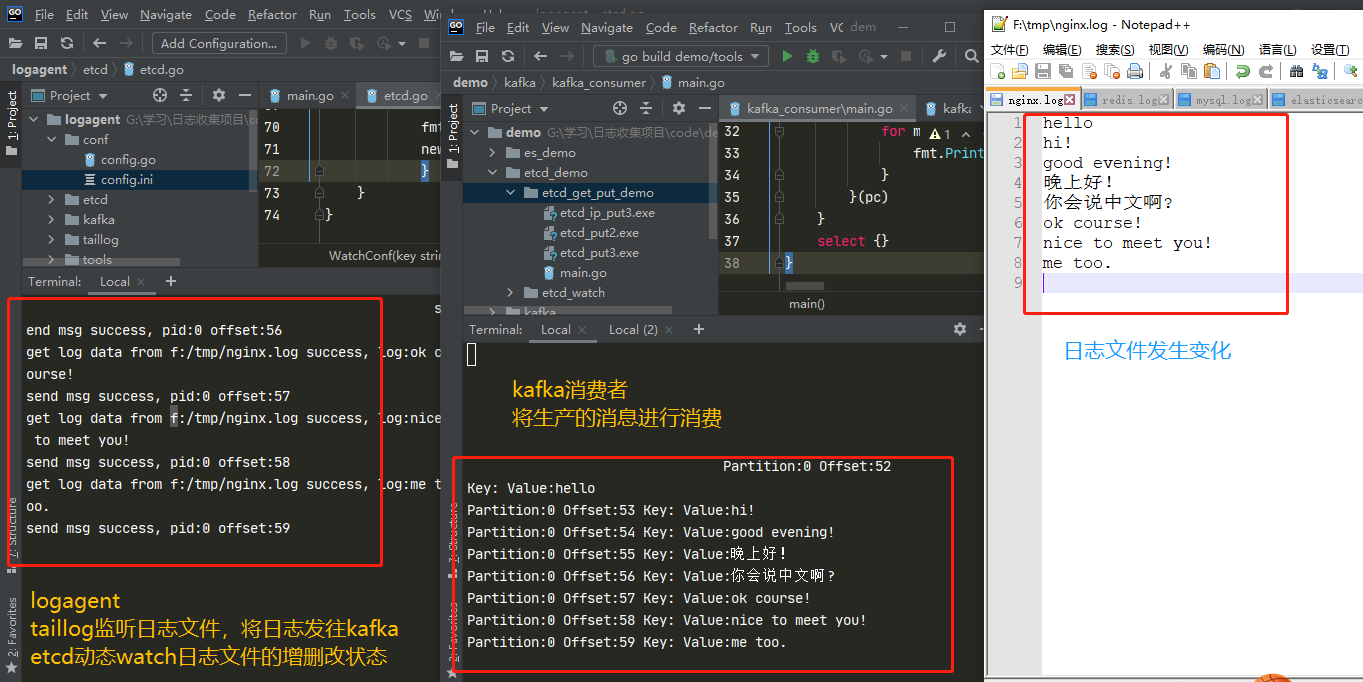日志收集系统系列(四)之LogAgent优化
-
logagent根据etcd的配置创建多个tailtask -
logagent实现watch新配置 -
logagent实现新增收集任务 -
logagent删除新配置中没有的那个任务 -
logagent
-
config/config.ini[kafka] address=127.0.0.1:9092 chan_max_size=100000 [etcd] address=127.0.0.1:2379 timeout=5 collect_log_key=/logagent/%s/collect_config
-
config/config.gopackage conf type Config struct { Kafka Kafka `ini:"kafka"` Etcd Etcd `ini:"etcd"` } type Kafka struct { Address string `ini:"address"` ChanMaxSize int `ini:"chan_max_zise"` } type Etcd struct { Address string `ini:"address"` Key string `ini:"collect_log_key"` Timeout int `ini:"timeout"` } -
main.gopackage main import ( "fmt" "gopkg.in/ini.v1" "logagent/conf" "logagent/etcd" "logagent/kafka" "logagent/taillog" "logagent/tools" "strings" "sync" "time" ) var config = new(conf.Config) // logAgent 入口程序 func main() { // 0. 加载配置文件 err := ini.MapTo(config, "./conf/config.ini") if err != nil { fmt.Printf("Fail to read file: %v", err) return } // 1. 初始化kafka连接 err = kafka.Init(strings.Split(config.Kafka.Address, ";"), config.Kafka.ChanMaxSize) if err != nil { fmt.Println("init kafka failed, err:%v\n", err) return } fmt.Println("init kafka success.") // 2. 初始化etcd err = etcd.Init(config.Etcd.Address, time.Duration(config.Etcd.Timeout) * time.Second) if err != nil { fmt.Printf("init etcd failed,err:%v\n", err) return } fmt.Println("init etcd success.") // 实现每个logagent都拉取自己独有的配置,所以要以自己的IP地址实现热加载 ip, err := tools.GetOurboundIP() if err != nil { panic(err) } etcdConfKey := fmt.Sprintf(config.Etcd.Key, ip) // 2.1 从etcd中获取日志收集项的配置信息 logEntryConf, err := etcd.GetConf(etcdConfKey) if err != nil { fmt.Printf("etcd.GetConf failed, err:%v\n", err) return } fmt.Printf("get conf from etcd success, %v\n", logEntryConf) // 2.2 派一个哨兵 一直监视着 zhangyafei这个key的变化(新增 删除 修改)) for index, value := range logEntryConf{ fmt.Printf("index:%v value:%v\n", index, value) } // 3. 收集日志发往kafka taillog.Init(logEntryConf) var wg sync.WaitGroup wg.Add(1) go etcd.WatchConf(etcdConfKey, taillog.NewConfChan()) // 哨兵发现最新的配置信息会通知上面的通道 wg.Wait() } -
kafka/kafka.gopackage kafka import ( "fmt" "github.com/Shopify/sarama" ) // 专门往kafka写日志的模块 type LogData struct { topic string data string } var ( client sarama.SyncProducer // 声明一个全局的连接kafka的生产者client logDataChan chan *LogData ) // init初始化client func Init(addrs []string, chanMaxSize int) (err error) { config := sarama.NewConfig() config.Producer.RequiredAcks = sarama.WaitForAll // 发送完数据需要leader和follow都确认 config.Producer.Partitioner = sarama.NewRandomPartitioner // 新选出⼀个partition config.Producer.Return.Successes = true // 成功交付的消息将在success channel返回 // 连接kafka client, err = sarama.NewSyncProducer(addrs, config) if err != nil { fmt.Println("producer closed, err:", err) return } // 初始化logDataChan logDataChan = make(chan *LogData, chanMaxSize) // 开启后台的goroutine,从通道中取数据发往kafka go SendToKafka() return } // 给外部暴露的一个函数,噶函数只把日志数据发送到一个内部的channel中 func SendToChan(topic, data string) { msg := &LogData{ topic: topic, data: data, } logDataChan <- msg } // 真正往kafka发送日志的函数 func SendToKafka() { for { select { case log_data := <- logDataChan: // 构造一个消息 msg := &sarama.ProducerMessage{} msg.Topic = log_data.topic msg.Value = sarama.StringEncoder(log_data.data) // 发送到kafka pid, offset, err := client.SendMessage(msg) if err != nil{ fmt.Println("sned msg failed, err:", err) } fmt.Printf("send msg success, pid:%v offset:%v\n", pid, offset) //fmt.Println("发送成功") } } } -
etcd/etcd.gopackage etcd import ( "context" "encoding/json" "fmt" "go.etcd.io/etcd/clientv3" "strings" "time" ) var ( cli *clientv3.Client ) type LogEntry struct { Path string `json:"path"` // 日志存放的路径 Topic string `json:"topic"` // 日志发往kafka中的哪个Topic } // 初始化etcd的函数 func Init(addr string, timeout time.Duration) (err error) { cli, err = clientv3.New(clientv3.Config{ Endpoints: strings.Split(addr, ";"), DialTimeout: timeout, }) return } // 从etcd中获取日志收集项的配置信息 func GetConf(key string) (logEntryConf []*LogEntry, err error) { ctx, cancel := context.WithTimeout(context.Background(), time.Second) resp, err := cli.Get(ctx, key) cancel() if err != nil { fmt.Printf("get from etcd failed, err:%v\n", err) return } for _, ev := range resp.Kvs { //fmt.Printf("%s:%s\n", ev.Key, ev.Value) err = json.Unmarshal(ev.Value, &logEntryConf) if err != nil { fmt.Printf("unmarshal etcd value failed,err:%v\n", err) return } } return } // etcd watch func WatchConf(key string, newConfChan chan<- []*LogEntry) { rch := cli.Watch(context.Background(), key) // <-chan WatchResponse // 从通道尝试取值(监视的信息) for wresp := range rch { for _, ev := range wresp.Events { fmt.Printf("Type: %s Key:%s Value:%s\n", ev.Type, ev.Kv.Key, ev.Kv.Value) // 通知taillog.taskMgr var newConf []*LogEntry //1. 先判断操作的类型 if ev.Type != clientv3.EventTypeDelete { // 如果不是是删除操作 err := json.Unmarshal(ev.Kv.Value, &newConf) if err != nil { fmt.Printf("unmarshal failed, err:%v\n", err) continue } } fmt.Printf("get new conf: %v\n", newConf) newConfChan <- newConf } } } -
taillog/taillog.gopackage taillog import ( "context" "fmt" "github.com/hpcloud/tail" "logagent/kafka" ) // 专门收集日志的模块 type TailTask struct { path string topic string instance *tail.Tail // 为了能实现退出r,run() ctx context.Context cancelFunc context.CancelFunc } func NewTailTask(path, topic string) (t *TailTask) { ctx, cancel := context.WithCancel(context.Background()) t = &TailTask{ path: path, topic: topic, ctx: ctx, cancelFunc: cancel, } err := t.Init() if err != nil { fmt.Println("tail file failed, err:", err) } return } func (t TailTask) Init() (err error) { config := tail.Config{ ReOpen: true, // 充新打开 Follow: true, // 是否跟随 Location: &tail.SeekInfo{Offset: 0, Whence: 2}, // 从文件哪个地方开始读 MustExist: false, // 文件不存在不报错 Poll: true} t.instance, err = tail.TailFile(t.path, config) // 当goroutine执行的函数退出的时候,goriutine就退出了 go t.run() // 直接去采集日志发送到kafka return } func (t *TailTask) run() { for { select { case <- t.ctx.Done(): fmt.Printf("tail task:%s_%s 结束了...\n", t.path, t.topic) return case line :=<- t.instance.Lines: // 从TailTask的通道中一行一行的读取日志 // 3.2 发往kafka fmt.Printf("get log data from %s success, log:%v\n", t.path, line.Text) kafka.SendToChan(t.topic, line.Text) } } } -
taillog/taillog_mgrpackage taillog import ( "fmt" "logagent/etcd" "time" ) var taskMrg *TailLogMgr type TailLogMgr struct { logEntry []*etcd.LogEntry taskMap map[string]*TailTask newConfChan chan []*etcd.LogEntry } func Init(logEntryConf []*etcd.LogEntry) { taskMrg = &TailLogMgr{ logEntry: logEntryConf, taskMap: make(map[string]*TailTask, 16), newConfChan: make(chan []*etcd.LogEntry), // 无缓冲区的通道 } for _, logEntry := range logEntryConf{ // 3.1 循环每一个日志收集项,创建TailObj // logEntry.Path 要收集的全日志文件的路径 // 初始化的时候齐了多少个tailTask 都要记下来,为了后续判断方便 tailObj := NewTailTask(logEntry.Path, logEntry.Topic) mk := fmt.Sprintf("%s_%s", logEntry.Path, logEntry.Topic) taskMrg.taskMap[mk] = tailObj } go taskMrg.run() } // 监听自己的newConfChan,有了新的配合过来之后就做对应的处理 func (t *TailLogMgr) run() { for { select { case newConf := <- t.newConfChan: // 1. 配置新增 for _, conf := range newConf { mk := fmt.Sprintf("%s_%s", conf.Path, conf.Topic) _, ok := t.taskMap[mk] if ok { // 原来就有,不需要操作 continue }else { // 新增的 tailObj := NewTailTask(conf.Path, conf.Topic) t.taskMap[mk] = tailObj } } // 找出原来t.logEntry有,但是newConf中没有的,删掉 for _, c1 := range t.logEntry{ // 循环原来的配置 isDelete := true for _, c2 := range newConf{ // 取出新的配置 if c2.Path == c1.Path && c2.Topic == c1.Topic { isDelete = false continue } } if isDelete { // 把c1对应的这个tailObj给停掉 mk := fmt.Sprintf("%s_%s", c1.Path, c1.Topic) // t.taskNap[mk] ==> tailObj t.taskMap[mk].cancelFunc() } } // 2. 配置删除 // 3. 配置变更 fmt.Println("新的配置来了!", newConf) default: time.Sleep(time.Second) } } } // 一个函数,向外暴露taskMgr的newConfChan func NewConfChan() chan <-[]*etcd.LogEntry { return taskMrg.newConfChan } -
tools/get_ippackage tools import ( "net" "strings" ) // 获取本地对外IP func GetOurboundIP() (ip string, err error) { conn, err := net.Dial("udp", "8.8.8.8:80") if err != nil { return } defer conn.Close() localAddr := conn.LocalAddr().(*net.UDPAddr) //fmt.Println(localAddr.String()) ip = strings.Split(localAddr.IP.String(), ":")[0] return }![]()
三. 连接kafka进行消费
-
package main import ( "context" "fmt" "net" "strings" "time" "go.etcd.io/etcd/clientv3" ) // 获取本地对外IP func GetOurboundIP() (ip string, err error) { conn, err := net.Dial("udp", "8.8.8.8:80") if err != nil { return } defer conn.Close() localAddr := conn.LocalAddr().(*net.UDPAddr) fmt.Println(localAddr.String()) ip = strings.Split(localAddr.IP.String(), ":")[0] return } func main() { // etcd client put/get demo // use etcd/clientv3 cli, err := clientv3.New(clientv3.Config{ Endpoints: []string{"127.0.0.1:2379"}, DialTimeout: 5 * time.Second, }) if err != nil { // handle error! fmt.Printf("connect to etcd failed, err:%v\n", err) return } fmt.Println("connect to etcd success") defer cli.Close() // put ctx, cancel := context.WithTimeout(context.Background(), time.Second) value := `[{"path":"f:/tmp/nginx.log","topic":"web_log"},{"path":"f:/tmp/redis.log","topic":"redis_log"},{"path":"f:/tmp/mysql.log","topic":"mysql_log"}]` //value := `[{"path":"f:/tmp/nginx.log","topic":"web_log"},{"path":"f:/tmp/redis.log","topic":"redis_log"}]` //_, err = cli.Put(ctx, "zhangyafei", "dsb") //初始化key ip, err := GetOurboundIP() if err != nil { panic(err) } log_conf_key := fmt.Sprintf("/logagent/%s/collect_config", ip) _, err = cli.Put(ctx, log_conf_key, value) //_, err = cli.Put(ctx, "/logagent/collect_config", value) cancel() if err != nil { fmt.Printf("put to etcd failed, err:%v\n", err) return } // get ctx, cancel = context.WithTimeout(context.Background(), time.Second) resp, err := cli.Get(ctx, log_conf_key) //resp, err := cli.Get(ctx, "/logagent/collect_config") cancel() if err != nil { fmt.Printf("get from etcd failed, err:%v\n", err) return } for _, ev := range resp.Kvs { fmt.Printf("%s:%s\n", ev.Key, ev.Value) } } -
消费者代码
package main import ( "fmt" "github.com/Shopify/sarama" ) // kafka consumer func main() { consumer, err := sarama.NewConsumer([]string{"127.0.0.1:9092"}, nil) if err != nil { fmt.Printf("fail to start consumer, err:%v\n", err) return } partitionList, err := consumer.Partitions("web_log") // 根据topic取到所有的分区 if err != nil { fmt.Printf("fail to get list of partition:err%v\n", err) return } fmt.Println("分区: ", partitionList) for partition := range partitionList { // 遍历所有的分区 // 针对每个分区创建一个对应的分区消费者 pc, err := consumer.ConsumePartition("web_log", int32(partition), sarama.OffsetNewest) if err != nil { fmt.Printf("failed to start consumer for partition %d,err:%v\n", partition, err) return } defer pc.AsyncClose() // 异步从每个分区消费信息 go func(sarama.PartitionConsumer) { for msg := range pc.Messages() { fmt.Printf("Partition:%d Offset:%d Key:%s Value:%s\n", msg.Partition, msg.Offset, msg.Key, msg.Value) } }(pc) } select {} } -
运行步骤
-
开启zookeeper
-
开启kafka
-
开启etcd
-
设置收集项配置到etcd
-
运行logagent从etcd加载收集项配置,使用taillog监听日志文件内容,将新增的日志内容发往kafka
-
连接kafka进行消费
-
添加日志内容,观察logagent生产和kafka消费状态
![]()
-






 浙公网安备 33010602011771号
浙公网安备 33010602011771号